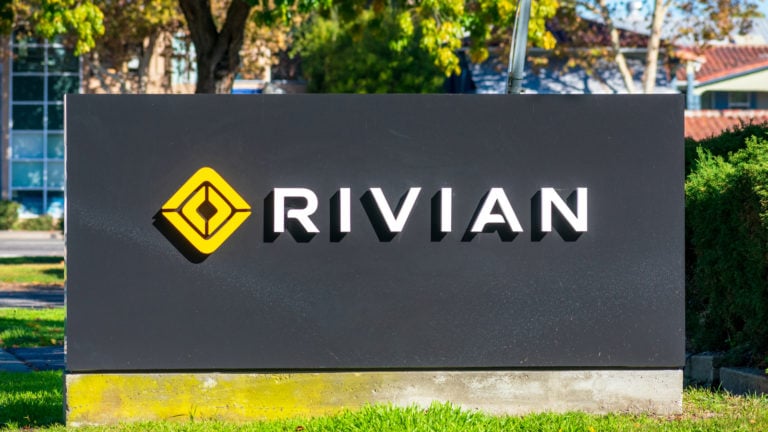To understand the mainline concern about electric vehicle manufacturer Rivian Automotive (NASDAQ:RIVN) and why retail investors shouldn’t immediately jump on the technically bullish sentiment in the options market comes down to the classic cost-benefit analysis. Yes, RIVN does look more attractive thanks to its Volkswagen (OTCMKTS:VWAGY) deal. That should help Rivian stock, especially in the pursuit of cheaper EVs. However, there’s a catch.
Professional baseball offers an excellent analogy. Offensively, two basic approaches are available: bat for average or bat for power. The former approach requires a different swing and a different mentality. Essentially, the player is focused on shortening his swing, thereby improving the odds of frequently getting more positive contact on the ball but at the sacrifice of raw power.
On the other hand, some players may opt for exactly that, raw power. In this case, the swing is longer and the ability to make positive contact with the ball is more challenging. However, when the ball collides with perfect mechanics — well, some lucky fan is about to get a souvenir. Of course, the tradeoff with this approach is a lower average of success.
With Rivian stock, targeting the middle-income crowd with more reasonably priced EVs brings opportunities. No one’s denying that. However, it also brings with it challenges that I’m not sure investors are fully appreciating.
Rivian Stock and the EV Cost-Benefit Curse
Very few analysts (if any) seriously dispute that the EV sector faces significant challenges. From sector leader Tesla (NASDAQ:TSLA) to upstart rival Lucid Group (NASDAQ:LCID), several enterprises have attempted to sway the upper-income crowd to part ways with its discretionary dollars. Right now, that effort has resulted in a price war. In other words, the rich folks that have wanted to make the transition to EVs have largely done so.
To use the prior analogy, batting for power may not be the most suitable approach. Therefore, EV firms are batting for average: they’re focusing on offering cheaper EVs that more regular folks can afford. By winning on volume, they hope to eventually win on the bottom line. That’s why a lot of investors have turned to Rivian stock.
The Volkswagen deal should provide a cash influx for Rivian to develop its affordable class of EVs. The company will launch its R2 SUV in 2026, which should have a price tag of $45,000 to start. One year later, Rivian aims to introduce the R3, which could come in at an estimated $37,000.
So, what’s the problem with that? Basically, lower-income consumers are less likely to enjoy home-charging solutions. For example, they could be living in apartments that lack such charging capabilities. Naturally, that means such drivers will have to use public charging solutions.
The issue with this is that public charging is a lot more frustrating than it may appear on paper. Not only does charging take more time but the length of charging takes far longer to charge from 80% capacity to all the way full. However, because newly transitioned EV drivers carry over the habits from fueling up their combustion-based vehicles, chargers get clogged up by inconsiderate drivers.
Options Trade Nuances to Consider
After several frustrating spells when a 30-minute stop turns into four hours — as a CNN op-ed mentioned – EV drivers will likely make the transition back to combustion-based vehicles. That wouldn’t be good for Rivian stock or the rest of the EV industry.
Still, the bulls may point out that on Friday, Barchart’s options flow data, which lists out big block transactions likely placed by institutional or professional traders, shows that net trade sentiment stood at just over $1.01 million in favor of the optimists.
Net trade sentiment is calculated by adding all the premiums of options tied to bullish sentiment and bearish sentiment and figuring out where the balance is. In this case, premiums tied to bullish options reached $1.35 million. On the other end, bearish premiums totaled $338,800 below breakeven. That’s a big gap in sentiment.
However, the biggest premium was for sold puts — specifically, the 2025 March 21 $14 put. Here, it appears that one trader sold (wrote) 3,800 puts with a price (or premium) of $2.74, for a total premium of $1.04 million. In other words, for the right to sell Rivian stock at $14, one put holder must pay $274 ($2.74 premium multiplied by 100 shares).
Based purely on intrinsic value, Rivian stock must fall to $11.26 per share for the put buyer to break even. Of course, there’s a time value component to options. That involves some wonky math that goes well beyond the scope of this article.
The bottom line, though, is this: so long as Rivian meanders around $14, the put sellers (writers) will benefit. That’s not exactly a decisively bullish sentiment. Rather, it’s more that the smart money is not overly bearish.
The Takeaway: RIVN Stock May End Up Being a Wash
With the power play of attempting to corner the affluent side of the EV market not panning out so well, Rivian is attempting to go the other route: lower the price, raise the volume. However, that comes with its own challenges, particularly convincing new EV customers to deal with the sector’s unique pain points.
As such, options traders are basically betting that RIVN stock will meander sideways for a while. That’s not overtly bearish but it’s not a convincingly optimistic view either.
On the date of publication, Josh Enomoto did not have (either directly or indirectly) any positions in the securities mentioned in this article. The opinions expressed in this article are those of the writer, subject to the InvestorPlace.com Publishing Guidelines.
On the date of publication, the responsible editor did not have (either directly or indirectly) any positions in the securities mentioned in this article.

